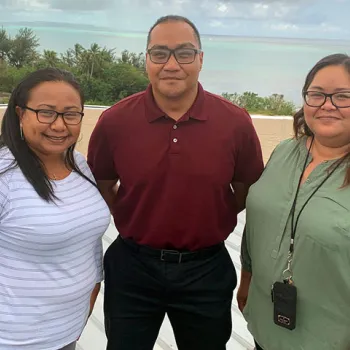Attracting, training, and retaining a skilled and diverse workforce are hallmarks of the federal Judiciary. Critical support systems and innovative human resource practices are vital to the efficient operation and management of the Judiciary.
Updating Staffing Formulas
In September 2019, the Judicial Conference approved updated staffing formulas for the courts of appeals and circuit offices, and reviewed the formulas for bankruptcy administrators’ offices. The formulas are based on data from more than 1,700 Judiciary personnel. The new formulas for courts of appeals and circuit offices more accurately reflect staffing needs for emergency management, case support, and administrative support. Nationwide, the formulas show that those courts and offices need an additional 99 full-time-equivalent (FTE) positions, a 5.9 percent increase. The Conference and its Judicial Resources Committee determined that no changes were needed for the formulas for the bankruptcy administrators’ offices, so they will continue using staffing levels established in 2015. In the coming months, the committee will study staffing formulas for probation and pretrial services offices and for the courts’ administrative support staff.
Federal Law Clerk Hiring Plan
A new Federal Law Clerk Hiring Plan, adopted in some courts on a trial basis, gives prospective law clerks more time to concentrate on their studies, obtain work experience, and otherwise build their resumes before applying for clerkships. Under the plan, federal judges consider only applicants with at least two years of law school experience, which addresses the concern of law school officials that first-year law students be allowed to focus on their course work. The Judicial Conference’s Ad Hoc Committee on Law Clerk Hiring will evaluate the two-year pilot in 2020, with input from the AO’s Online System for Clerkship Application and Review (OSCAR) Working Group and program staff. Second-year law students were given access to OSCAR beginning on Feb. 6, 2019, to search for clerkship positions and to build online applications.
Human Resources Information System
Improvements aimed at a better user experience were made to the Human Resources Management Information System (HRMIS). In June 2019, new functionality was implemented in HRMIS for onboarding new judges, other Judiciary employees, volunteers, and contractors. The improvements eliminate the need for data entry into multiple systems when people are hired and allow new employees to gain access to relevant information and tools on their first day of work. The Administrative Office of the U.S. Courts (AO) also brought an additional 38 courts and court offices onto an updated leave tracking module in HRMIS, bringing the total to 77 percent of the Judiciary.
Diversity Programs
The Judiciary is committed to diversifying its workforce and maintaining a civil and fair workplace. Since 2010, the AO has facilitated local court participation in 132 career fairs and legal recruiting events, resulting in direct contacts with thousands of students. The AO coordinates attendance by judges and court staff at local career fairs, where they can meet one-on-one with diverse pools of potential employees and highlight the advantages of working in the Judiciary.
Another outreach effort is the Summer Judicial Internship Program, which pairs federal judges with outstanding law students from diverse backgrounds. In 2019, 293 students from 21 law schools applied, and 32 students were placed with federal judges. The program is a partnership of the Judicial Conference’s Committee on Judicial Resources and an educational foundation called Just the Beginning – A Pipeline Organization.
The Model Intern Diversity Pilot is aimed at encouraging students to pursue careers in the Judiciary. In 2019, four AO-funded interns worked in court districts in Southern Mississippi, Minnesota, Rhode Island, and South Dakota.
Expanded Training Opportunities
In 2019, the AO continued to expand its offerings of online training programs, webinars, and in-person events to help Judiciary employees improve their knowledge and skills. New courses cover topics including military leave, performance management, and background investigation reports. A series of Benefits for Life Hour sessions address retirement planning and saving, mental illness, and other topics. Training conferences were held for bankruptcy clerks and court unit executives and their chief deputies. Over the past six years, more than 12,000 Judiciary employees have taken Judiciary Online University classes, particularly those focused on writing, workplace harassment, leadership, and time management.
In partnership with courts and federal defender organizations, the AO offers programs that provide opportunities for employees to expand into new areas and to work on projects outside their regular responsibilities. In 2019, 167 court and federal defender organization employees participated in temporary duty and extended collaboration assignments, 26 AO employees participated in intensive orientations to court operations, and the AO sponsored an in-depth knowledge seminar about criminal trials.
Director’s Leadership Program
Each year, at least one senior court employee is chosen for the Director’s Leadership Program, a yearlong residency that offers well-qualified court employees the opportunity to work on national projects while gaining a greater understanding of national issues and policies. The Director’s Leadership Program resident for 2019 is Sarah R. Johnson, supervisory probation officer in the Western District of Washington Probation Office.

Sarah R. Johnson
Johnson joined the national Probation and Pretrial Services Office to work on multiple issues related to implementing the First Step Act of 2018. She helped coordinate the system-wide effort on the sentencing and prison reform provisions of the act by organizing working groups, documenting tasks and requirements, responding to inquiries from the courts, and developing training.
The First Step Act resulted in sweeping changes to the criminal justice system. For example, it requires the creation of a system of risk and needs assessment and recidivism reduction programs that allow qualified prisoners (excluding those convicted of specified offenses) to earn time toward early release.
Johnson has a law degree from the University of Washington and has been in the federal probation and pretrial services system for over a decade. She has served in pretrial, presentence, and post-conviction supervisory roles.
2019 Director’s Awards
The AO Director presents the Director’s Awards each year to recognize outstanding performance in the federal courts. They are given for outstanding leadership, innovation and efficiency, and commitment to delivering the best possible service to the public. The recipients are nominated by colleagues based on career achievements and contributions to specific projects that have benefited their home courts and the federal Judiciary as a whole.
In 2019, Judiciary employees from 10 courts received Director’s Awards in the following areas: Outstanding Leadership, Excellence in Court Operations/Administration, Excellence in Court Operations/Technology, Excellence in Court Operations/Support, Excellence in Court Operations/Mission Requirements, and Extraordinary Actions.
Director’s Award for Outstanding Leadership
This award is given to candidates who lead national endeavors to improve the federal Judiciary, exhibit exemplary stewardship of resources, lead innovations that improve service and use of resources, improve public access to and awareness of the role of the Judiciary, and enhance the image of the federal Judiciary.
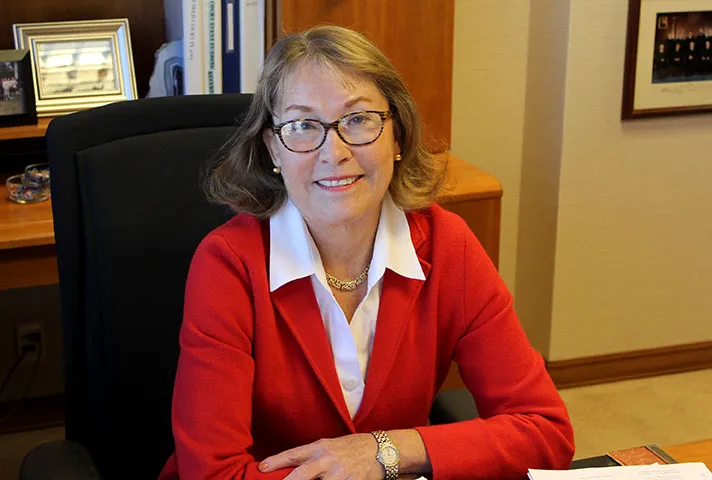
The 2019 recipient is Margaret Wiegand, circuit executive for the Third Circuit, who has played a leading role in initiatives to ensure an exemplary workplace for federal Judiciary employees.
In 2019, she chaired the Model Employment Dispute Resolution Working Group, and since 2018 she has served on the Federal Judiciary Workplace Conduct Working Group, a panel formed after instances of workplace harassment sparked a national debate.
“Margaret serves as a role model for all Judiciary executives,” wrote U.S. District Judge Roslynn R. Mauskopf, of the New York Eastern District and chair of the Judicial Conference’s Judicial Resources Committee. “Her guidance is invaluable; her judgment rock solid. Simply put, Margaret is the epitome of a Judiciary leader — skilled, committed, passionate, and principled.”
The Workplace Conduct Working Group delivered a comprehensive series of recommendations to ensure that employees can work in an environment free of mistreatment. The Judicial Conference has approved almost all of the group’s proposals, including a new Model Employment Dispute Resolution plan that simplifies and expands options for addressing wrongful workplace conduct.
Wiegand also chaired a committee that addresses staffing formulas for appellate courts and circuit offices, and co-chaired the Judiciary’s Human Resources Advisory Council.
“I cannot overstate Margaret’s role in tackling and solving some of the most critical challenges that we face in today’s workplace,” wrote Chief Judge D. Brooks Smith, of the Third Circuit Court of Appeals. “No member of the ‘Federal Judicial Family’ can be more deserving of this award than Margaret Wiegand.”
Director’s Award for Excellence in Court Operations/Administration
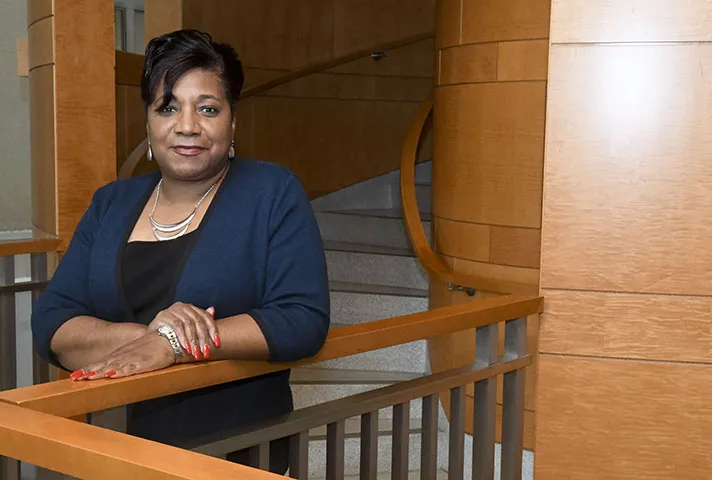
Angela D. Caesar, clerk of court for the U.S. District Court and the Bankruptcy Court for the District of Columbia, “has distinguished herself through her leadership, integrity, innovation, fiscal responsibility, problem-solving skills, and work ethic, as well as her efforts to promote transparency and public access to the courts,” wrote Chief District Judge Beryl A. Howell in a nominating letter submitted with the full support of the court’s judges. “She has spearheaded a number of successful initiatives that have been replicated in courts nationwide.”
Caesar and her office deftly cope with the unique challenges of a court located in the nation’s capital.
In response to the court’s high volume of criminal investigations, Caesar’s office developed the nation’s first all-electronic system for filing and approving sealed investigative applications, such as those for warrants.
“The system has proven so popular that leadership of the Department of Justice’s Criminal Division has requested expansion of the program,” Howell wrote. Investigators can attest to electronic documents by telephone, instead of appearing in person before a magistrate judge.
According to Howell, “One law enforcement agent recently commented, ‘That was the quickest and most efficient process I have ever experienced in 21 years of working for the government.’”
Another unusual feature of the court is its role in cases of national significance, including lengthy grand jury investigations.
“Numerous sealed and sensitive documents were processed by our Clerk’s Office, and not once was there a leak of information,” Howell wrote. “The training and professionalism exhibited by Ms. Caesar’s office under the glare of the national spotlight … was a tribute to Ms. Caesar’s outstanding leadership.”
Caesar’s office also regularly pilots Judiciary system innovations, and she has employed numerous cost-cutting measures, such as innovative building practices. During an interruption in federal funding in early 2019, her office returned $350,000 to the Judiciary that could be used for other needs.
“Ms. Caesar’s day-to-day fiscal management of the district and bankruptcy courts has been exemplary,” Howell wrote. “She regularly makes decisions that result in cost savings to both our court and the Judiciary.”
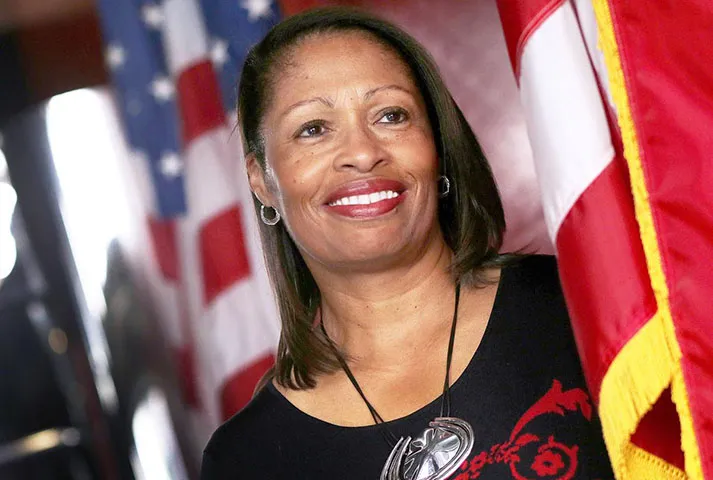
Marcia M. Anderson, clerk of court for the U.S. Bankruptcy Court for the Western District of Wisconsin and a retired U.S. Army Reserve general, “is an exceptional leader who has served the Judiciary over these past 27 years with honor and distinction,” according to a nominating letter from Chief Judge Catherine J. Furay.
Anderson has served on numerous national Judiciary committees, including the Bankruptcy Clerks Advisory Group, Space and Security Advisory Council, and Advisory Process Review Working Group, of which she is co-chair. In her role as clerk, she helped reduce bankruptcy building space in Eau Claire, WI, a move that will save more than $1.2 million in rent over 14 years.
Anderson has been a faculty member for the Federal Court Clerks Association’s Leadership Lessons of Antietam, drawing on the Civil War battle to guide discussions among court administrators on leadership and decision-making. She also gives community talks and acts as a mentor to personnel in other courts.
“She has mentored many judicial employees from other court units, not once asking for praise or recognition,” Furay wrote. “Marcia is the epitome of what we look for in our leaders.”

Michael Rhodes, clerk of court for the U.S. Bankruptcy Court for the Western District of Pennsylvania, has achieved a high level of efficiency through the use of technology and automation, while demonstrating an exceptional level of stewardship over court funds and property.
In a letter of nomination, Bankruptcy Judge Jeffery Deller wrote that Rhodes’ “leadership and pursuit of efficiency have benefited our court, our district, our circuit, the Judiciary, the bar and the public,” earning the respect of his colleagues and the bar.
Rhodes helped bring together leaders from bankruptcy courts, and later district courts and probation offices, throughout the Third Circuit to examine IT security issues. The collaboration led to the Judiciary’s first circuit-level IT security plan.
“Mike Rhodes is one of the most conscientious, committed individuals I have worked with in my 32 years with the Judiciary,” wrote Mark Soltys, the Third Circuit’s chief deputy for information and technology. “He is an excellent collaborator who improves whatever project or effort he is a part of.”
Fellow Clerk Timothy McGrath, of the U.S. Bankruptcy Court for the Eastern District of Pennsylvania, wrote, “His inclusive and collaborative approach to management results in all boats rising in this safe harbor of trust and fellowship. He makes us all better administrators for the efforts he promotes.”
Rhodes serves as co-chair of the Judiciary’s Information Technology Advisory Council. He also is a member of the Bankruptcy Clerks Advisory Group and numerous local committees. Rhodes has given local, regional, and national presentations on topics affecting the courts.
Deller also praised Rhodes’ attention to the vigilant monitoring of expenses. A protocol for the triple review of payment vouchers led to the court’s first 100 percent clean external audit.
“Mike’s message to our management team is that the money was precious at the moment it left the taxpayers’ hands and it was precious at the time it left the [Administrative Office] as a local court allotment,” Deller wrote. “Accordingly, it is among our highest duties to respect the taxpayers and the AO by spending that money wisely.”
Director’s Award for Excellence in Court Operations/Technology
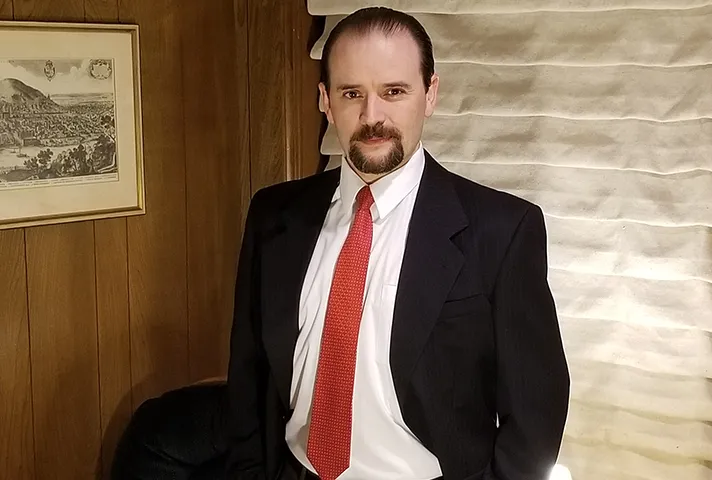
Johnathan Wiltshire, a programmer analyst for the Northern District of Oklahoma Probation Office, created a comprehensive mobile phone application that enables probation officers to list their day’s field visits efficiently while keeping supervisors continuously notified of their location. It became the basis for a national tool currently used by probation officers in more than 70 districts.
“The app is revolutionary in its functionality by incorporating all the requirements of an officer’s field day into one application accessed through the officer’s mobile phone,” wrote Todd B. Gollihare, chief probation officer for the Northern District of Oklahoma. The app “has allowed officers nationwide to become more efficient and effective in their fieldwork, while incorporating an added layer of safety and protection for the officer.”
The app organizes information from a system called the Probation and Pretrial Services Automated Case Tracking System (PACTS), enabling officers to list field visits according to the level of risk posed by a person under community supervision and whether the client is in a residential or commercial setting. The field list is automatically emailed to the officer’s supervisor.
The app also contains a safety feature that, when activated, “transmits the officer’s name, field partner, the client’s name, the address of the contact, and the officer’s current GPS location to their supervisor,” Gollihare wrote. “If the safety feature is not deactivated in a predetermined time period, the app alerts the supervisor that the officer may be in danger.”
Officers also can use the app to select an available government vehicle, generate an electronic travel log, and calculate mileage.
Wiltshire “developed the app to be customizable to the unique challenges and requirements of probation officers … from the Alaskan wilderness to the streets of New York City,” Gollihare wrote. “Johnathan’s vision and innovation have made a real and tangible impact on officers in the field throughout the country.”
Director’s Award for Excellence in Court Operations/Support

Patricia S. “Pat” Connor, clerk of court for the U.S. Court of Appeals for the Fourth Circuit, has operated her office as a model of courtesy, efficiency, innovation, and service — winning praise from the circuit’s judges, lawyers, and court professionals.
“She is truly the heart and soul of the Fourth Circuit, and the judges and court staff will uniformly attest to that,” wrote Judge J. Harvie Wilkinson III. “Pat’s leadership makes the court run like a finely tuned timepiece.”
Letters supporting Connor’s nomination were written by more than a dozen federal judges, by district court clerks throughout the Fourth Circuit, and even by federal prosecutors and federal public defenders whose case files Connor’s office administers.
“Federal defenders have a not wholly undeserved reputation as a contrary, independent-minded group who rarely agree on anything,” said a letter signed by the circuit’s nine federal public defenders. “But when it comes to Ms. Connor, we are unanimous; she is an exemplar of everything a public servant should be.”
Letters noted Connor’s commitment — personally traveling to the hometowns of new judges to make sure their chambers and staff are properly functioning, and even wading through flooded hallways during a 2019 water leak to ensure the circuit’s Richmond, VA, courthouse was operating the next day.
Judges praised Connor for sound legal advice, saying they routinely turn to her on ethics-related and procedural questions. She also is credited with spearheading a highly successful high school civics essay contest and upgrading the circuit’s public and internal websites.
Most of all, she is praised for inspiring her staff to provide friendly and nearly flawless service.
“She has created an office that is a model of cooperation and competence,” wrote Judge Diana Gribbon Motz. “Each year or so, we do anonymous surveys of lawyers asking their views of the court. … Never has the clerk’s office received a single complaint. Rather, lawyers initiate compliments on the innovations and efficiency of Pat’s office.”
Director’s Award for Excellence in Court Operations/Mission Requirements
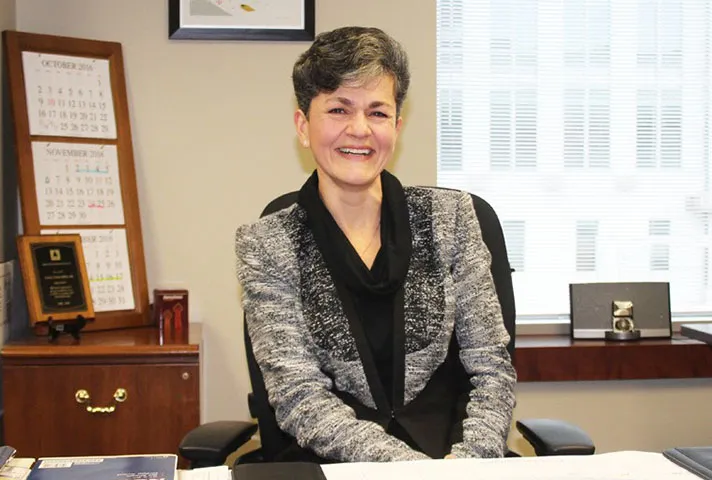
Photo courtesy of The Daily Record (Omaha, Nebraska).
Laura Garcia-Hein, staff Spanish interpreter for the District of Nebraska, has directly helped Spanish-speaking defendants in her adopted state and across the country, while also helping to train and locate courtroom interpreters in a wide variety of languages and dialects.
“It is impossible to overstate the significance of Laura’s contributions on both a local and a national level,” wrote Denise M. Lucks, clerk of court for the District of Nebraska, and Gabriela Acosta, chief deputy clerk of court.
Garcia-Hein, a lawyer in her native Costa Rica, moved to the District of Nebraska in 2007 to become the court’s first and only staff Spanish interpreter. Since then, she has worked tirelessly to provide interpreting services to Nebraska and the neighboring districts, as well as to provide long-distance services across the country, under the Telephone Interpreters Program.
According to the nominating letter, from 2015 through 2019 alone, Garcia-Hein personally conducted thousands of telephone interpreter sessions, saving the government more than $1.6 million in court interpreter costs.
In addition to interpreting, the nominating letter said, “Laura has been an important resource for the Administrative Office of the United States Courts, helping to locate interpreters who speak a variety of languages and dialects, and coordinating interpreting services among the nation’s 94 districts.”
Garcia-Hein also has conducted numerous training sessions for interpreters, lawyers, and judges in the proper use of interpreting services and the management of court interpreting resources.
“Laura is a brilliant and entertaining instructor, as well as a highly respected colleague,” the nominating letter said. “She is dedicated, energetic, and extremely resourceful. In addition, she is always willing to share her talents and time with other interpreters and courts. We are extraordinarily fortunate to have Laura living and working in the state of Nebraska.”
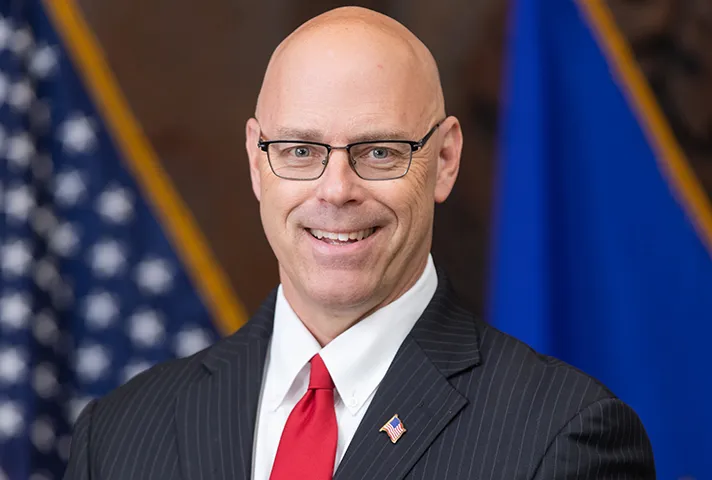
Wade Warren, chief probation officer for the District of North Dakota, led a national effort to build awareness and resources to support overall wellness among the Judiciary’s probation and pretrial officers.
Since 2007, Warren has helped develop a national focus on and momentum in wellness. Further efforts of the committee he led included a casualty assistance guide, a wellness website, and electronic learning modules, which probation and pretrial services staff can access anonymously.
“The topic of wellness is particularly important for U.S. Probation and Pretrial Services,” wrote Melissa A. Alexander, chief probation officer for the Middle District of North Carolina, and Connie Smith, chief probation officer for the Western District of Washington. “Rates of suicide in law enforcement are nearly double the national average.”
“Chief Warren’s willingness to disclose his own struggles with stress gave permission to many leaders to begin talking more openly about the impact of stress and to create a culture of wellness,” Alexander and Smith added in their nominating letter. Warren’s efforts sought to destigmatize stress and remove the barriers to seeking help.
Warren helped plan the system’s first national wellness conference in 2018, and he was a member of the Federal Judicial Center’s Committee on Probation and Pretrial Services Education. He has spearheaded the use of biofeedback embedded in reality-based safety training. The training included evidence-based skills to counter acute and accumulated stress. He also advocated for the inclusion of resilience as a core competency for probation and pretrial services officers.
“As the jobs of probation officers become more and more stressful, the importance of staff wellness cannot be understated,” Alexander and Smith wrote. “His active advocacy of wellness has helped the federal Judiciary become a leader in staff wellness, particularly as it relates to probation officers.”
Director’s Award for Extraordinary Actions

District of Arizona probation staff, the morning after they had put out a fire while on a field supervision visit to a village inside the Grand Canyon. They are, from left, Winter Martinez, supervisory U.S. probation officer; Cory Clever, senior U.S. probation officer; and Jordan Gaiser, senior U.S. probation officer.
Three probation officers from the District of Arizona, during a “normal” field supervision trip to a tribal village at the base of the Grand Canyon, risked their personal safety to prevent a fire from destroying the homes of Havasupai Reservation residents.
On March 18, 2019, Senior Probation Officers Cory Clever and Jordan Gaiser and Supervisory Probation Officer Winter Martinez hiked 11 miles into the base of the canyon, where Clever, based in Flagstaff, supervised a portion of his caseload. Gaiser and Martinez, both based in Tucson, were familiarizing themselves with the remote setting and Havasupai population.
Shortly after midnight, they noticed smoke and “saw a nearby home fully engulfed in flames, with a fire that threatened the surrounding area, structures, and community,” according to a nominating letter written by Annie M. Richey and Sharie Lutt, assistant deputy chief probation officers.
For the next few hours, the probation officers became emergency firefighters. Their only equipment was a local fire hose and a single shovel.
“Our three officers quickly recognized there was no fire department or emergency response team nearby and sprang into action to contain and fight the fire themselves, without proper safety gear,” Richey and Lutt wrote. “They acted as a team with courage and resiliency out of concern for the safety of others and with the knowledge there was no safe retreat out of the canyon.”
The letter added: “Jordan assisted in the firefight by knocking down the walls of the burning structure to keep them from falling outward and spreading the fire.” They also used the shovel to throw dirt over the burning embers. By 2:30 a.m., the fire was finally extinguished.
Probation officers often play many roles, monitoring compliance with court supervision orders, and counseling and finding services to help those under supervision rebuild their lives.
“Their experience on this trip serves as a reminder that no field contact is ever normal,” the nominating letter concluded, “as well as that great challenges can be mastered with passionate and dedicated teamwork.”
The staff of the District Court for the Northern Mariana Islands Clerk of Court’s Office, judicial chambers, and Probation and Pretrial Services were honored for overcoming the challenges of two violent storms in recent years.
“Their swift action avoided what would’ve been a disastrous mold infection,” following a 2015 typhoon, according to a nominating letter from Chief Judge Ramona V. Manglona. “They endured two major typhoons yet continued to operate the court, with minimal disruption, under extraordinary emotional and physical stress.”
When Typhoon Soudelor struck the island of Saipan in August 2015, trees and power lines blocked many roads. Employees negotiated those barriers to reach the courthouse, where they quickly used vacuums and fans to begin drying out water damage.
With most of the island lacking electricity, court employees worked with the U.S. Marshals Service and local agencies to ensure a supply of diesel fuel for a generator. “This fueled generator not only allowed the court to reopen,” Manglona wrote, “it was vital to reducing the humidity in the building to prevent dangerous and damaging mold growth.”
In October 2018, Super Typhoon Yutu struck Saipan with sustained wind speeds of more than 170 miles per hour. “The widespread devastation was shocking,” Manglona wrote. “The massive storm turned roofs into rubble while frightened inhabitants hid in back rooms, closets and bathrooms.”
Whereas the courthouse reopened in 10 days in 2015, the staff needed only five days to reopen in 2018. By the second storm, employees were well-versed in emergency procedures. “This knowledge,” Manglona wrote, “meant the federal court remained available during a crisis.”
“The employees of the District Court for the Northern Marianas exemplified Marianas Strong (the mantra of the island after Super Typhoon Yutu),” Manglona wrote. “We are incredibly fortunate to work with these brave, compassionate, and steadfast employees.”
Annual Report 2019
- Annual Report 2019
- Funding/Budget
- The Courts and Congress
- The Federal Bench
- Accountability and Resource Management
- Facilities and Security
- Public Outreach
- Court Operations and Case Management
- Defender Services
- Probation and Pretrial Services
- Human Resources
- Information Systems and Cybersecurity
- Recent and Proposed Amendments to Federal Rules
- In Profile


